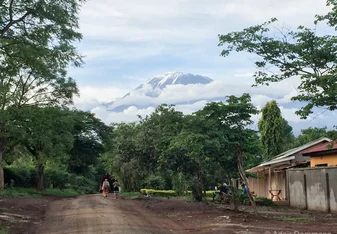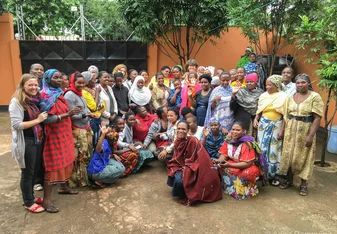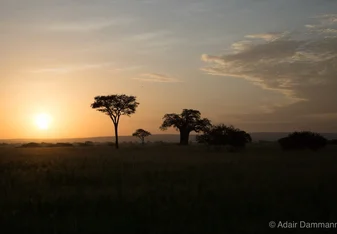Why did you choose this program?
I combed the internet for months looking for an opportunity to live in a community in Africa, offer my skills and energy in whatever way could be useful, and humbly learn from the people with whom I work. I wanted to find a program that is genuinely nested in a community, and which is deeply respectful of the people it serves. I quickly learned the difference between a good website and a good program! I learned to look for volunteer reviews on each program I was considering.
The way that Give A Heart to Africa described the expectations and responsibilities of its volunteers first sold me: GHTA conveyed such respect for the cultures of their adult women students. Then I found a volunteer review that said “six months was not enough time here”, and I knew that I had found a place where I could do meaningful, eye-opening, and rewarding work.
What did your program provider assist you with, and what did you have to organize on your own?
GHTA has an extremely thorough volunteer handbook that helps incoming volunteers anticipate just about everything, from voltage requirements of electrical devices to security arrangements at the volunteer house. Most reassuring to me as I prepared was knowing that the school and volunteer compound has 24/7 security on site, and a cook who makes dinner 6 nights a week.
This helped me feel comfortable traveling “alone” halfway around the world and dropping into a new community. I had to make my own flight arrangements, but GHTA arranged airport transfer. A Skype interview with the school helped me prepare to deal with passport, immigration, and visa particulars.
What is one piece of advice you'd give to someone going on your program?
Pack less! Going to a faraway land, you may think you need to bring everything, but that is just anxiety talking! Travel light; you can find, rent, or buy almost anything you actually need.
Once there, avoid spending all your time with other Western travelers – find ways to mix and meet with people in the community you are visiting. Seek out adventure! Find some folks to take day trips or weekend trips with. Spend for a safari! Visit museums. Visit schools. Attend church services or classes. Ask for recommendations from others.
When walking around the neighborhood and markets, leave the camera behind. It stands between you and the local people – they do not like it, and they will feel used. Instead, feast with your eyes and ears and nose. Take it all in. Ride the packed buses, and laugh!
Finally, you will get homesick. Being in a foreign culture is exhilarating but exhausting as well. Breathe. Take some quiet time alone, take care of yourself, and get back to it!
What does an average day/week look like as a participant of this program?
From Monday through Thursday, we spend half days teaching, and the afternoon is for doing a mix of teaching, tutorial, laundry, trips to the market for groceries, or the wifi café, and some time for exploring. Then, dinner with fellow volunteers follows.
In the evening, we do class preparations, movies, reading, or hanging out with staff. Friday which is everyone’s favorite is for a field trip to visit a student’s family which can sometimes be a long journey. Then you get “tea” time which lasts hours and may involve several courses, visits from all the neighbors and family members, and some very moving conversation.
Weekends are for travel; safari and hiking opportunities are numerous. You can also go exploring town, watch local soccer tournaments, visit restaurants, museums, or whatever.
Going into your experience abroad, what was your biggest fear, and how did you overcome it? How did your views on the issue change?
I worried about whether I would feel useless, as a Western volunteer in an undefined situation (Certainly, many voluntourists report that experience.) However, I was deeply engaged in making our school work for our students. GHTA volunteers work hard and have to bring a lot of creativity and ingenuity to the work. I tried my hardest to be a good teacher of English, and worked as hard as I have worked at any job.
The students’ gratitude was boundless. It’s hard to know whether we, volunteers, make a difference in our students’ lives, but they certainly made a difference in mine!
What special challenges face older volunteers?
None! (At least, after finding a good placement designed to work with volunteers long past our “Gap Year”.) Elders hold special status among traditional cultures where I worked, which was pleasant. I think bringing some age and perspective to our mix – both among school staff, students, and other volunteers – made a good experience for us all. Curiosity, an open mind, humility, and generosity will carry you into and through the adventure.


